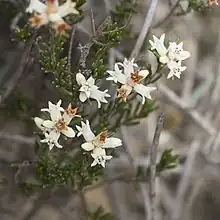Cryptandra hispidula
Cryptandra hispidula, commonly known as rough cryptandra,[2] is a species of flowering plant in the family Rhamnaceae and is endemic to South Australia. It is a small shrub with clustered, cylindrical leaves, and tube-shaped white flowers surrounded by leafy bracts.
| Cryptandra hispidula | |
|---|---|
 | |
| In Cox Scrub Conservation Park | |
| Scientific classification | |
| Kingdom: | Plantae |
| Clade: | Tracheophytes |
| Clade: | Angiosperms |
| Clade: | Eudicots |
| Clade: | Rosids |
| Order: | Rosales |
| Family: | Rhamnaceae |
| Genus: | Cryptandra |
| Species: | C. hispidula |
| Binomial name | |
| Cryptandra hispidula | |
Description
Cryptandra hispidula is a shrub that typically grows to a height of 20–30 cm (7.9–11.8 in), its branchlets covered with star-shaped hairs and rough. The leaves are clustered and more or less needle-shaped, 3–6 mm (0.12–0.24 in) long and about 0.5 mm (0.020 in) wide with the edges rolled under, concealing the lower surface. The flowers are sessile, arranged in clusters of up to 8 at the ends of branches and are white, tube-shaped, 4–6 mm (0.16–0.24 in) long and surrounded by 4 or 5 hairy brown bracts about half as long as the floral tube. The sepals are 3–4 mm (0.12–0.16 in) long and silky-hairy, the style nearly as long as the floral tube. Flowering occurs in most months.[2][3]
Taxonomy
Cryptandra hispidula was first formally described in 1858 by Siegfried Reissek and Ferdinand von Mueller in the journal Linnaea from specimens collected by Charles Stuart.[4][5] The specific epithet (hispidula) means "somewhat rough".[6]
Distribution and habitat
Rough cryptandra mainly grows in swampy country on Kangaroo Island and the southern Mount Lofty Ranges of South Australia.[2]
References
- "Cryptandra hispidula". Australian Plant Census. Retrieved 14 December 2022.
- "Cryptandra hispidula". State Herbarium of South Australia. Retrieved 15 December 2022.
- Bentham, George; von Mueller, Ferdinand (1863). Flora Australiensis. Vol. 1. London: Lovell Reeve & Co. p. 439. Retrieved 15 December 2022.
- "Cryptandra hispidula". APNI. Retrieved 15 December 2022.
- Reissek, Siegfried; von Mueller, Ferdinand (1858). "Plantae Muellerianae Australasicae - Celastrineae, Rhamneae". Linnaea: ein Journal für die Botanik in ihrem ganzen Umfange, oder Beiträge zur Pflanzenkunde. 29 (3): 294. Retrieved 15 December 2022.
- Sharr, Francis Aubi; George, Alex (2019). Western Australian Plant Names and Their Meanings (3rd ed.). Kardinya, WA: Four Gables Press. p. 218. ISBN 9780958034180.